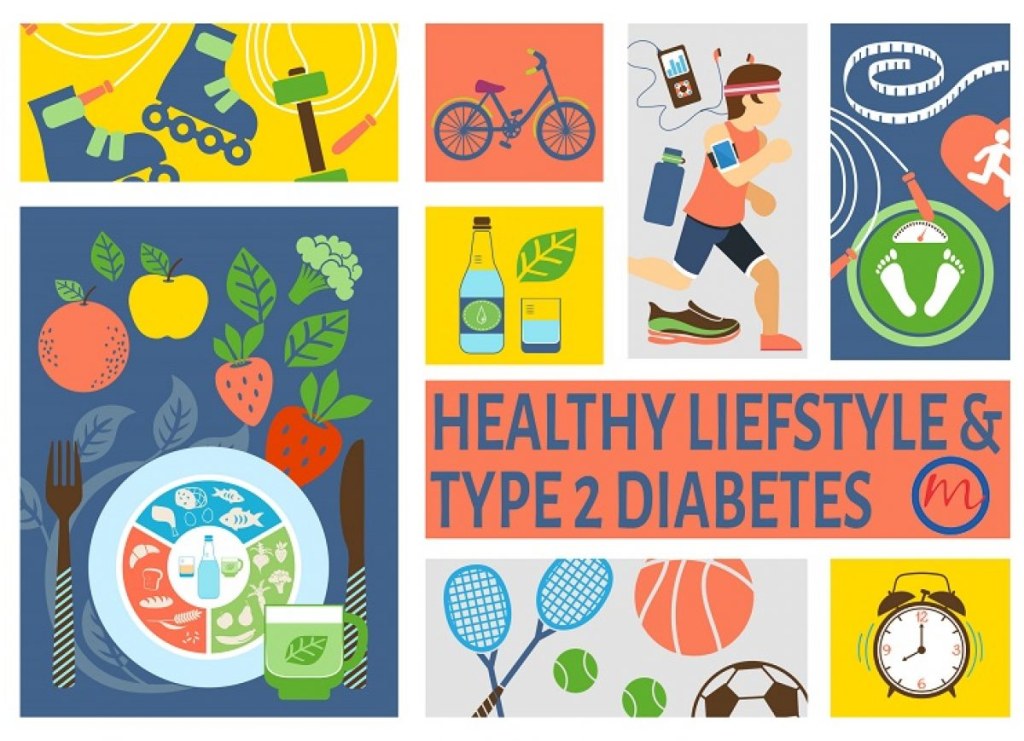Transforming Lives: Empowering Healthy Living For Type 2 Diabetes – Take Charge Today!
Healthy Living for Type 2 Diabetes: A Guide to Managing Your Health
Welcome, readers! Living a healthy lifestyle is crucial for individuals with type 2 diabetes, as it can effectively manage their condition and improve their overall well-being. In this article, we will explore the various aspects of healthy living for type 2 diabetes, providing you with valuable information to help you take control of your health.
Introduction
Type 2 diabetes is a chronic condition characterized by high blood sugar levels. It affects millions of people worldwide and can lead to serious health complications if not properly managed. Adopting healthy lifestyle practices is essential for keeping blood sugar levels in check and minimizing the risk of complications.
2 Picture Gallery: Transforming Lives: Empowering Healthy Living For Type 2 Diabetes – Take Charge Today!


In this comprehensive guide, we will delve into the what, who, when, where, why, and how of healthy living for type 2 diabetes, addressing key concerns and providing practical tips on managing your health effectively.
What is Type 2 Diabetes?
🔍 Type 2 diabetes is a metabolic disorder where the body becomes resistant to insulin or fails to produce enough insulin. This leads to high blood sugar levels, which can cause various complications such as heart disease, kidney damage, and nerve damage.
Living a healthy lifestyle is crucial for effectively managing type 2 diabetes and preventing complications. By following a balanced diet, engaging in regular physical activity, monitoring blood sugar levels, and taking prescribed medication, individuals with type 2 diabetes can lead fulfilling and healthy lives.
A Balanced Diet

Image Source: drmohans.com
🔍 A balanced diet is the cornerstone of managing type 2 diabetes. It involves consuming a variety of nutrient-rich foods in appropriate portions to maintain stable blood sugar levels. Focus on incorporating whole grains, lean proteins, fruits, vegetables, and healthy fats into your meals.
Eating smaller, frequent meals throughout the day can help regulate blood sugar levels. It is also essential to limit the intake of sugary beverages, processed foods, and foods high in saturated fats. Consult with a registered dietitian to create a personalized meal plan that suits your specific needs.
Regular Physical Activity
🔍 Regular physical activity plays a vital role in managing type 2 diabetes. Engaging in aerobic exercises, such as brisk walking, swimming, or cycling, helps lower blood sugar levels, improves insulin sensitivity, and promotes weight loss.
Aim for at least 150 minutes of moderate-intensity aerobic exercise per week, spread across several days. Additionally, incorporating strength training exercises two to three times a week helps build muscle mass and further enhance insulin sensitivity. Remember to consult with your healthcare provider before starting any exercise program.
Blood Sugar Monitoring
🔍 Regular monitoring of blood sugar levels is crucial for individuals with type 2 diabetes. This allows you to understand how your body responds to various foods, physical activity, and medication. By keeping track of your blood sugar levels, you can make informed decisions about your diet, exercise, and medication management.

Image Source: aaci.org
Invest in a reliable blood glucose monitoring system and work with your healthcare provider to establish target ranges for your blood sugar levels. By monitoring your levels consistently, you can identify patterns and make adjustments to your lifestyle or medication regimen as needed.
Medication Management
🔍 In some cases, medication may be necessary to manage type 2 diabetes effectively. This may include oral medications, insulin injections, or a combination of both. It is essential to take your prescribed medication as directed by your healthcare provider.
Regularly monitor your blood sugar levels and report any significant changes or concerns to your healthcare provider. They will work with you to adjust your medication regimen, if necessary, to ensure optimal control of your blood sugar levels.
Who is at Risk for Type 2 Diabetes?
🔍 Type 2 diabetes can affect individuals of any age, but certain factors increase the risk. These include being overweight or obese, having a sedentary lifestyle, having a family history of diabetes, and being over the age of 45.
Additionally, individuals from certain ethnic backgrounds, such as African Americans, Hispanics, Native Americans, and Asians, are more prone to developing type 2 diabetes. Women who have had gestational diabetes during pregnancy are also at an increased risk.
Weight Management
🔍 Maintaining a healthy weight is crucial for preventing and managing type 2 diabetes. If you are overweight or obese, losing as little as 5-10% of your body weight can significantly improve insulin sensitivity and blood sugar control.
Focus on making sustainable lifestyle changes such as adopting a balanced diet, engaging in regular physical activity, and managing stress levels. Consult with a registered dietitian and healthcare provider to create a personalized weight loss plan that suits your specific needs.
The Role of Genetics
🔍 Family history plays a significant role in the development of type 2 diabetes. If you have a parent or sibling with type 2 diabetes, you are at a higher risk of developing the condition. While genetics cannot be changed, adopting a healthy lifestyle can help mitigate the risk.
Even if you have a family history of type 2 diabetes, making healthy choices in terms of diet, exercise, and overall lifestyle can positively impact your health and reduce the likelihood of developing diabetes.
When Should You Seek Medical Assistance?
🔍 It is essential to seek medical assistance if you experience symptoms such as increased thirst, frequent urination, unexplained weight loss, fatigue, or blurred vision. These could be signs of undiagnosed or poorly controlled type 2 diabetes.
Additionally, if you have been diagnosed with type 2 diabetes and notice any significant changes in your blood sugar levels, medication requirements, or overall health, consult with your healthcare provider promptly. Regular check-ups and communication with your healthcare team are essential for effective diabetes management.
Where Can You Find Support?
🔍 Managing type 2 diabetes can be challenging, but you don’t have to do it alone. Seek support from healthcare professionals, such as doctors, nurses, and registered dietitians, who specialize in diabetes management. They can provide guidance, answer your questions, and help you navigate your health journey.
Additionally, there are various support groups, both online and offline, that connect individuals with type 2 diabetes. These communities offer a safe space for sharing experiences, seeking advice, and finding encouragement from others who understand the challenges of living with diabetes.
Why is Healthy Living Important for Type 2 Diabetes?
🔍 Embracing a healthy lifestyle is essential for individuals with type 2 diabetes as it can have numerous benefits:
Blood Sugar Control
🔍 A healthy lifestyle, including a balanced diet, regular physical activity, and medication management, helps control blood sugar levels. This reduces the risk of complications and promotes overall well-being.
Weight Management
🔍 Maintaining a healthy weight is crucial for managing type 2 diabetes effectively. Following a balanced diet and engaging in regular physical activity can help achieve and maintain a healthy weight, reducing the risk of complications.
Heart Health
🔍 Healthy living practices, such as eating a balanced diet, exercising regularly, and managing blood pressure and cholesterol levels, promote heart health. This is crucial for individuals with type 2 diabetes, as they have an increased risk of heart disease.
Mental Well-being
🔍 Living a healthy lifestyle contributes to improved mental well-being. Regular physical activity releases endorphins, which boost mood and reduce stress. A balanced diet provides essential nutrients that support brain health.
Quality of Life
🔍 By embracing healthy living practices, individuals with type 2 diabetes can enhance their overall quality of life. They can enjoy increased energy levels, improved physical and mental health, and a reduced risk of complications.
How Can You Start Living a Healthy Lifestyle?
🔍 Transitioning to a healthy lifestyle may seem overwhelming at first, but taking small, manageable steps can make a significant difference. Here are some tips to get you started:
Set Realistic Goals
🔍 Start by setting realistic goals that are specific, measurable, attainable, relevant, and time-bound (SMART). For example, aim to walk for 30 minutes five days a week or replace sugary beverages with water or herbal tea.
Create a Meal Plan
🔍 Work with a registered dietitian to create a personalized meal plan that suits your specific dietary needs and preferences. Include a variety of nutrient-rich foods, such as whole grains, lean proteins, fruits, vegetables, and healthy fats.
Stay Active
🔍 Find physical activities that you enjoy and incorporate them into your routine. This could be walking, cycling, swimming, or dancing. Aim for at least 150 minutes of moderate-intensity aerobic exercise per week.
Manage Stress
🔍 Chronic stress can negatively impact blood sugar levels. Practice stress management techniques such as mindfulness, deep breathing exercises, or engaging in activities that bring you joy and relaxation.
Monitor Blood Sugar Levels
🔍 Invest in a reliable blood glucose monitoring system and regularly check your blood sugar levels. This will help you understand how your body responds to various foods, physical activity, and medication.
Stay Educated
🔍 Keep yourself informed about the latest research, guidelines, and advancements in diabetes management. Attend educational events, read reputable sources, and consult with healthcare professionals to stay up to date.
Engage in Self-Care
🔍 Prioritize self-care activities that promote physical, mental, and emotional well-being. This could include getting enough sleep, practicing relaxation techniques, spending time with loved ones, or pursuing hobbies.
Advantages and Disadvantages of Healthy Living for Type 2 Diabetes
🔍 Like any lifestyle change, healthy living practices for type 2 diabetes have their advantages and disadvantages. Let’s explore both:
Advantages:
⭐ Improved blood sugar control
⭐ Weight management
⭐ Reduced risk of complications
⭐ Enhanced overall health and well-being
⭐ Increased energy levels
Disadvantages:
⚠️ Initial adjustments may be challenging
⚠️ Requires commitment and consistency
⚠️ May require additional financial resources for healthier food choices or gym memberships
⚠️ Social situations involving food can be challenging to navigate
⚠️ Requires ongoing monitoring and self-discipline
Frequently Asked Questions (FAQs)
Q: Can type 2 diabetes be reversed through healthy living?
A: While healthy living practices can effectively manage type 2 diabetes, reversing the condition entirely is unlikely. However, adopting a healthy lifestyle can significantly improve blood sugar control and overall health.
Q: Is it necessary to eliminate all sweets and desserts from the diet?
A: It is not necessary to eliminate all sweets and desserts from the diet. Moderation is key. Incorporate small portions of your favorite treats occasionally, and focus on overall balance and portion control in your daily meal plan.
Q: Can physical activity alone control type 2 diabetes?
A: Physical activity plays a crucial role in managing type 2 diabetes, but it is typically combined with other healthy lifestyle practices, such as a balanced diet and medication management, for optimal blood sugar control.
Q: Can stress affect blood sugar levels?
A: Yes, stress can affect blood sugar levels. During stressful situations, the body releases hormones that can temporarily raise blood sugar levels. It is important to practice stress management techniques to maintain stable blood sugar control.
Q: Are there any specific foods that can help lower blood sugar levels?
A: Certain foods, such as leafy greens, whole grains, lean proteins, and high-fiber foods, have a minimal impact on blood sugar levels. Incorporating these foods into your diet can help promote stable blood sugar control.
Conclusion: Taking Control of Your Health
🔍 Friends, living a healthy lifestyle is essential for individuals with type 2 diabetes to effectively manage their condition and improve their overall well-being. By adopting a balanced diet, engaging in regular physical activity, monitoring blood sugar levels, and taking prescribed medication, you can take control of your health and reduce the risk of complications.
Remember to seek support from healthcare professionals, connect with support groups, and stay educated about diabetes management. Embracing healthy living practices may have its challenges, but the advantages are numerous – improved blood sugar control, weight management, reduced risk of complications, enhanced overall health and well-being, and increased energy levels.
So, take that first step today and start living a healthy life with type 2 diabetes. Your health is in your hands, and with the right knowledge and support, you can thrive and enjoy a fulfilling life.
Final Remarks
🔍 Disclaimer: The information provided in this article is for educational purposes only and should not be considered as medical advice. Always consult with your healthcare provider before making any significant changes to your lifestyle, diet, or medication regimen.
This post topic: Wellness Insights

